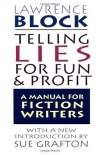Manual For Fiction Writers by Block, Lawrence (classic books to read .TXT) 📗

Book online «Manual For Fiction Writers by Block, Lawrence (classic books to read .TXT) 📗». Author Block, Lawrence
Did you want to say something, Rachel?
Ê
Just that we're all glad you're feeling better now, sir.
Ê
Why, thank you, Rachel. Now where was I?
No matter. I read a book recently that will serve us as a particularly good example of how a skillful author can motivate his characters and make us believe the dramatic validity of their actions. How many of you have read Wilderness, by Robert B. Parker? Raise your hands if you've read it. Haven't any of you read it? Arnold?
Ê
I guess the general feeling, sir, is why buy hardcover suspense novels?
Ê
I see.
Well, let me tell you about Wilderness then, since you haven't had a chance yet to read it for yourselves. The hero is a writer named Aaron Newman. He runs and lifts weights to keep in shape, and is passionately devoted to his wife of twenty years, this notwithstanding the fact that their marriage is rather crumby.
One day, while jogging home from the gym, Newman witnesses a murder. An honorable man, a man concerned with honor, he goes to the police and agrees to testify against the murderer, a notorious hoodlum. He returns from the police station to find his wife tied naked in their bedroom, a warning from the hoodlum. She has not been raped, merely violated optically and emotionally.
His code of honor notwithstanding, Newman promptly knuckles under, earns the contempt of the police by retracting his identification of the killer, and sets about trying to live with himself and his wife. This is made rather more difficult by his recognition of the fact that the sight of his wife, bound and helpless, has had an undeniable aphrodisiacal effect on him. Furthermore, his inability to protect his wife from these savages makes it harder for him to live with himself and accentuates his wife's propensities to reveal contempt for him in any number of ways, and?yes, Edna?
Ê
I think you're trying to say she's a ballbreaker, sir.
Ê
Thank you, Edna.
Now comes a test of Parker's ability to motivate his character. The plot he's devised calls for Newman and his wife to launch themselves upon a mission of revenge, to expunge the humiliation they have suffered by taking the law into their own hands and committing an uncharacteristic act of homicide. They are taking vengeance out of proportion to the injury inflicted upon them; although their adversary is unquestionably a murderer himself, all the Newmans have suffered at his hands is intimidation.
Mr. Parker makes this work by motivating his character a little at a time, and by arranging plot developments that derive naturally and directly from the characters and situation he has established. The idea of killing the hoodlums first comes up in a drunken conversation, with Newman throwing it out with macho bravado. The wife seizes on the idea?she wants these men dead and seems to have no trouble articulating the desire. And Chris Hood, a bar owner and friend of Newman's, takes up the idea.
Hood is an important character. He killed men in wartime, and rather liked it. His life since then hasn't come to much. The Newmans' mission of vengeance is an opportunity for him to live intensely as he has not been able to live in years. Furthermore, Hood has the skills for this sort of thing. With his assistance, the whole operation becomes conceivable.
The Newmans want to get the thing over and done with as quickly as possible, to kill their enemy and get away with it. Hood, however, has an infinite capacity for taking pains that ultimately amounts to a delaying tactic?he'd like to devote a lifetime to planning and reconnaissance and rehearsal, because once the dirty deed is done his d'�tre will no longer have any raison. This is excellent for plot purposes, in that a problem in many novels of vengeance is that the logical thing for the characters to do?i.e., take revenge quickly and directly?would bring the book to an abrupt and unsatisfying conclusion some twenty thousand words down the road, while a more circuitous route leaves the reader wondering why the characters aren't brighter and more to the point. Hood's vacillation, like Hamlet's, is not unreasonable, and it is Newman who is frustrated by it, not the reader.
Right about this point Mr. Parker boosts the ante a little. Although we may have accepted the Newmans' motivation in desiring revenge, it's been something they want, not something they need. Revenge might help their relationship, but the notion of killing some stranger to bolster your marriage is not something you're likely to encounter in Dear Abby. Indeed, we might have trouble avoiding some sympathy for their opponent as he goes through life as an unwitting target.
No problem. We learn that the hoodlum has elected to make assurance doubly sure by hiring a killer to hurry Newman off to kingdom come. We meet the killer as he plans his crime, and he's himself killed on Newman's own doorstep by Chris Hood, whom we've seen before on solitary, secret night vigils in the Newmans' yard, vigils which have seemed absurd until now.
See how the stakes have gone up? It's now kill-or-be-killed, because it's to be expected that their adversary will hire another killer when he learns of the failure of the first. This incident, too, makes the whole thing much more real for the Newmans. They have to take it seriously.
The locale





Comments (0)